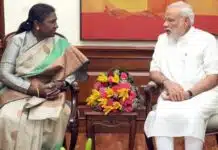Rahul Gandhi responded to Amit Shah’s criticism against Nehru
Congress leader Rahul Gandhi responded sharply to Home Minister Amit Shah’s recent criticism of India’s first prime minister, Jawaharlal Nehru. Gandhi asserted that Shah’s lack of historical knowledge leads him to continually rewrite history. “Pandit Nehru sacrificed his life for India; he spent years in jail for the country.
Amit Shah seems unaware of historical facts. I don’t expect him to understand history since he habitually revises it,” stated Congress MP Rahul Gandhi in reaction to Amit Shah’s remarks made in the Rajya Sabha. Amit Shah, during his Rajya Sabha address, attributed the Kashmir issue’s complexities to Nehru, citing the “mistakes” of an “untimely” ceasefire and involving the United Nations.
In response, Gandhi reaffirmed Nehru’s dedication to the nation, stating, “Pandit Nehru dedicated his life to our country. He was incarcerated for years. Amit Shah ji appears ignorant of history. I doubt he comprehends it given his tendency to rewrite it.” Rahul Gandhi also criticized the BJP’s diversionary tactics, highlighting the core concerns of caste census and financial accountability.
“The central concern revolves around conducting a caste census and ensuring transparent allocation of the nation’s finances. The BJP avoids discussing these issues and shies away from addressing them,” asserted the former Congress president outside Parliament. He affirmed that the Congress would persist in pursuing these matters to secure the rights of the underprivileged.
Responding to queries about the BJP appointing tribal and OBC Chief Ministers in Chhattisgarh and Madhya Pradesh, Rahul Gandhi emphasized the importance of meaningful representation within the administrative framework. “We also had an OBC Chief Minister in Chhattisgarh. Their appointment of an OBC Chief Minister in Madhya Pradesh isn’t the concern.
What matters is the level of representation within the structure,” clarified Rahul Gandhi. On another occasion, Amit Shah accused the opposition of overlooking the positive changes in Jammu and Kashmir following the revocation of Article 370. He attributed the suffering of the region’s people to Nehru’s alleged errors on the Kashmir issue.
During his Rajya Sabha address on the Jammu and Kashmir Reservation (Amendment) Bill, 2023, and Jammu and Kashmir Reorganisation (Amendment) Bill, 2023, Shah defended his stance. He referenced Field Marshal Sam Manekshaw and credited Sardar Patel’s intervention for the Indian Army’s involvement during the Pakistani invasion of Kashmir.
Shah mentioned a meeting where Sardar Patel questioned Nehru about securing Kashmir, highlighting the decision to deploy the army. He asserted that if a ceasefire hadn’t been initiated at the right moment, Pakistan-occupied Kashmir (PoK) wouldn’t exist. Amit Shah questioned why the Kashmir matter was taken to the UN.
Shah concluded by emphasizing the nation’s unwavering stance on territorial integrity and referenced Sam Manekshaw’s sentiments on not compromising even an inch of land. Amit Shah further emphasized the significance of preserving every inch of the nation’s land, echoing the sentiment expressed by Sam Manekshaw.
In response to Shah’s statements, various Congress leaders defended Nehru’s legacy, highlighting his pivotal role in the country’s freedom struggle and nation-building efforts. They underscored Nehru’s contributions as a visionary statesman, instrumental in shaping India’s democratic foundation and its foreign policy in the post-independence era.
Simultaneously, several political analysts and historians weighed in on the ongoing discourse, offering diverse interpretations of historical events related to the Kashmir matter. The debate continued to garner public attention, with discussions unfolding across social media platforms and in intellectual circles.
Amidst these divergent viewpoints, the political landscape remained charged, with both the ruling party and the opposition steadfastly holding onto their positions regarding Nehru’s legacy and his role in shaping the trajectory of Jammu and Kashmir’s history.
The discourse extended beyond the confines of parliamentary sessions, permeating into public discourse and reinforcing the significance of historical perspective in understanding contemporary political decisions and their implications on the nation’s present and future.
As the discussions persisted, opinions remained polarized, underscoring the complexity of historical interpretation and its impact on contemporary political narratives. The ongoing dialogue reflected the broader struggle to reconcile differing perspectives on the past while navigating the challenges of the present in India’s political landscape.
He reiterated that no one holds the authority to relinquish any part of the country’s territory merely to display magnanimity. The Home Minister’s assertions stirred a debate, prompting varied reactions from different quarters of the political spectrum. While the ruling party stood by Shah’s remarks, opposition leaders, including Rahul Gandhi, continued to counter his views on Nehru and the Kashmir issue.
Lok Sabha Panel Pushes for Mahua Moitra’s Bungalow Eviction via Housing Ministry





